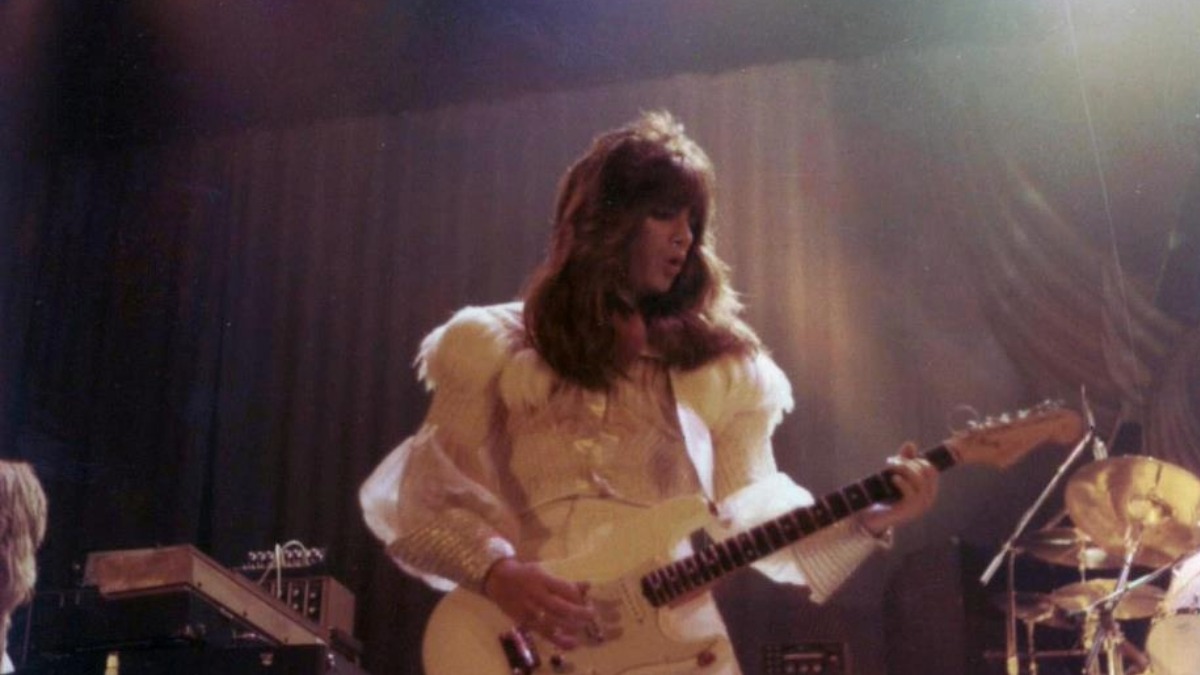Neck Deep: Diving Deeper
Neck Deep have always had a knack for making bold statements in album titles. But with their experimental pop-punk opera, All Distortions Are Intentional, they’ve gone above and beyond.

All the latest guitar news, interviews, lessons, reviews, deals and more, direct to your inbox!
You are now subscribed
Your newsletter sign-up was successful
At some point on the road down which every pop-punker travels, there comes a critical intersection: keep kickin’ it up with punk jumps and powerchords, or explore some more cultured, less preteen-friendly corners of the rock genre.
For the English riff-splitters in Neck Deep, it would’ve been a smart choice to stay cruising down the lane of least resistance – they blew up in the mid-2010s for reinvigorating the kind of loveably dorky 4/4 looseness that defines the pop-punk genre, and fans would happily have lept at a fourth collection of it.
But Neck Deep aren’t the type to rest on their laurels; especially not in 2020, with their strongest lineup yet and all eyes on them as they gear up follow two of the past decade’s biggest pop-punk releases. All Distortions Are Intentional is an audaciously ambitious, wide-sprawling concept album that shows the fivesome throwing caution to the wind and diving headfirst into a hectic new world of rock ’n’ roll ebullience.
Its title, as guitarist Sam Bowden tells us, refers not just to the cataclysmic story that frontman Ben Barlow unfurls across its 12 tracks, but also to the unpredictably sharp left turns that Neck Deep themselves steer it with.
How did LP4 being a concept record influence the direction you took in the writing process?
So to answer that, we have to go back a record further. The Peace And The Panic followed Life’s Not Out To Get You, which was such a memorable and monumental pop-punk album that it was like, “Okay, how do we follow this? What do we do here?” Because we wanted to take the logical next step, sonically, but didn’t want to alienate any of our fans. We were on tour at the time, and literally the day after the last show, we were in the studio tracking new songs – so it was very rushed. Five songs into it, we were picking singles… It was quite an odd experience to do The Peace And The Panic.
We were so concerned about not doing too much of one thing or not doing enough of another thing… And it was great in the end – I’m really stoked with how The Peace And The Panic turned out – but I think we were too caught up in our own heads for a lot of it. So with this album, we just wanted to come together and write what we write – don’t overthink too much, don’t say, “Oh, this isn’t pop-punk enough,” or, “This is too punk,” or, “This doesn’t sound like Neck Deep” – because ultimately, when Ben sings on it and Danny puts his drums to it, it’s going to have that Neck Deep flavour no matter what.
So we were like, “Let’s just write music, and then if it doesn’t end up working, it doesn’t end up working.” The concept idea didn’t come until a little bit after. Ben had written pretty much all of “Lowlife” on an acoustic guitar, and we were a bit like, “If anything, I don’t think this sounds like a Neck Deep song!” And then he had the idea for it being about this character Jet and falling in love with a girl named Alex – he explained this whole concept of how it could work, and how the songs could follow this story. And we were all like, “Okay sick, this will work great!”
All the latest guitar news, interviews, lessons, reviews, deals and more, direct to your inbox!
It gave us room to go in a few different directions with certain songs, and really take the listener on this journey – whether that’s sonically, or emotionally through the lyrics. It actually opened up a lot of freedom for us; for Ben, it was about not having the pressure to be like, “This is all true, this is my life story.” He had a little bit of wriggle room, knowing that these characters were fictional in the end, and Ben being super focussed on the narrative and having that stress-free environment, it made the rest of us super focussed as well. We weren’t concerned about whether anything would work or not – and it all worked out! It was a real pleasant experience.
Plus, Ben’s brother Seb – he’s always been like the unsung member of Neck Deep, and now he’s in the band playing bass, but he also ended up mixing this album as well, and he was mixing in the studio while we were tracking. So once we’d done a song, we’d hand it over to Seb, and he’d be in a different room in the house mixing it while we worked on other stuff. So by the end of the six weeks that we had in the studio, we had an almost fully mixed album. It was a pretty weird experience, not waiting two months to hear back from a mixing engineer.
So what were some of the new sounds and styles – and for yourself as a guitarist, playing techniques – that you were keen to explore?
Well I joined the band in 2015, just around the time they did Life’s Not Out To Get You. And so with The Peace And The Panic, I was really trying to stick within the guidelines and not do too much that they wouldn’t already be doing without me. So my personal sort of style – some of the more punkish riffs or country progressions that I like to write – I wouldn’t dream of putting any of that into The Peace And The Panic. But because of the way we loosened up the process for this record, I was able to go, “Okay, well this is how I hear the song,” or, “This is where I would want to go with it.”
For example, “Lowlife” being this sort of lackadaisical song, it was kind of like, “Okay, we need to get some Weezer tones in here. Let’s turn our shit up, let’s get a Marshall plugged in and cranked up high, and let’s go crazy on the overdrive.” Just things like that – things we’d never even thought about doing before. I don’t know whether that was because of nerves, or because we didn’t want to mess up the formula… In the past, it was kind of like, “Okay, we’re a pop punk band – three chords and the truth – let’s just stick with that.” And this album felt a bit like our chance to go, “Actually, no.”
Do you find that you’re able to use the guitar as a tool to set an emotional basis, or almost tell a story of its own in that way?
I think so. Like I mentioned with “Lowlife”, it was kind of like, “It’s just going to be this angsty song about this guy who doesn’t give a f*** – he’s just living his life, being a stoner, and that’s him.” And because of that, we had to go, “Well, we’re not going to give him a polished guitar tone with brand new strings on – let’s give him some raw, worn-in strings…” Like I said, we had the Marshall cranked up to full bore… I was listening through the stems the other week, and they sound ridiculous – I was stood in a room next to the amp while I played it, so it was feeding back the whole time, and it just sounds gnarly.
And so with certain songs, it was definitely like, “We want to capture this feeling.” We used things like an EBow to capture certain moods, too. It was just about being mindful of what the song was and what it needed. Ben would come to us and go, “Okay, this song is going to be about this,” and we would go, “Okay, well it’s a love song, so we’re not going to have some ripping solo going through it – we’ll make sure not to go in that direction.” There’s a song called “What Took You So Long?”, which to me is a little bit country sounding, and we used the EBow to get that glassy slide sound, just to try to capture the kind of mood that a classic love song would have.
It’s not too overthought, but it’s thought about enough that it all makes sense.

Ellie Robinson is an Australian writer, editor and dog enthusiast with a keen ear for pop-rock and a keen tongue for actual Pop Rocks. Her bylines include music rag staples like NME, BLUNT, Mixdown and, of course, Australian Guitar (where she also serves as Editor-at-Large), but also less expected fare like TV Soap and Snowboarding Australia. Her go-to guitar is a Fender Player Tele, which, controversially, she only picked up after she'd joined the team at Australian Guitar. Before then, Ellie was a keyboardist – thankfully, the AG crew helped her see the light…
